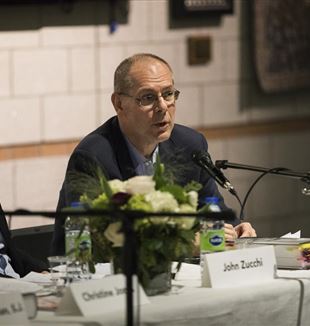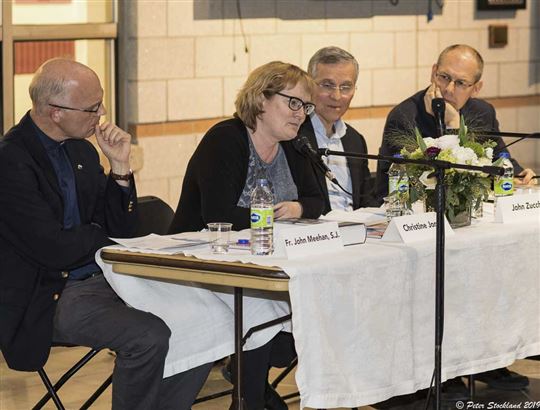
The Life of Luigi Giussani: A Presence that Attracts
On March 20 in Montréal, Canada, Alberto Savorana took part in the final Life of Luigi Giussani panel with Christine Jones, Fr. John Meehan, and John Zucchi. Read the full story.John Zucchi, professor of history and moderator, began the final night of the Life of Luigi Giussani book tour in Montréal, Canada, inviting Philip Cercone to make some remarks. Cercone, the Executive Director of McGill-Queen’s University Press, the publisher of the English editions of many of Giussani’s works and the biography, recounted the story of the book launch for The Religious Sense in London. He recalled informing Canada House, the venue for the book launch, that a few hundred people were expected to be in attendance. “They laughed and scoffed,” he said. However, the night of the launch about 500 people showed up, and to this day it was the most-attended book launch ever hosted at Canada House.
Alberto Savorana, author of The Life of Luigi Giussani, enthusiastically responded to Cercone’s remarks, remembering how moved Msgr. Luigi Giussani had been when his works were published in English. In fact, upon the McGill-Queen’s publication of The Religious Sense, Savorana reminisced, Giussani requested that the event be printed as the cover story of that month’s issue of Traces with the title, “A New Beginning.”
After this unexpected and enticing introduction, Zucchi kicked off the discussion by posing a question to the panelists: “Does Father Giussani’s way of facing the challenges during his lifetime have something to say to us as we face our challenges?”
First to respond was Christine Jones, president of Catholic Pacific College in Langley, British Columbia. Jones began by describing how reading The Life of Luigi Giussani has been an event in itself for her: “What I [discovered] in reading the pages of the book has changed me and converted me again and again to the original fascination I had when I first encountered the movement Communion and Liberation.” On that “beautiful day,” through the words of Giussani, Jones first realized that Christ was alive and present for her. This discovery was something completely different from the way she had been living her Catholic faith previously, “trying to be good as good as possible … except, of course, I was never very good.” 
The invitation to speak on The Life of Luigi Giussani came at a particularly difficult time for Jones--three weeks prior, her nephew-in-law passed away in a car accident. “Reality,” Jones paraphrased Giussani, “is simply, … utterly given to us.” Jones described how a friend of hers apologized “for this senseless tragedy.” “He meant well,” clarified Jones, “but it is not senseless. [Giussani’s] genius, intuition, and way of communicating the Christian fact is that everything that happens [is a] sign and carries a meaning that is greater than us ... and is intentioned towards a loving presence.” The way in which we educate young people then, Jones explained, “can only be to introduce each person to this reality pregnant with meaning.”
Jones concluded, “Giussani’s path is simple, but not easy;” simple, in as much as everyone is basically aware of the fact that we are not masters of the universe. Yet, she continued, “It’s not easy, because so many things ... conspire to cover our original needs.” Jones expressed her gratitude to Savorana for giving her this book, which accompanied her through a difficult time, and which re-introduced her to her “teacher,” Giussani.
Next to speak was Fr. John Meehan, S.J., Prefect of L’Eglise de Gesù and interim director of the Newman Center at McGill University. Meehan pointed out that the biography seems to operate on two different levels, the first being biographical events from Giussani’s life, and the second, the charism of Giussani. As someone who works often with young people, Meehan was particularly struck by Giussani’s work with university students: “How present he was to these young people, not giving them all the answers, but … being with them in the struggles and the questions.”
In reading The Life of Luigi Giussani, Meehan found three aspects of Giussani’s charism particularly impactful. First, he appreciated Giussani’s “diagnosis of the malaise of modernity” in response to the turbulent events of the 1960s. “As I read this section,” he commented, “I can’t help but think of our own lives now.” In front of such issues as the current political climate and the current crisis in the church, “there is a call for deeper authenticity,” said Meehan, “and I believe Giussani has much to say to us about this.” As a Jesuit, Meehan was also struck by Giussani’s emphasis on experience and encounter rather than rules and dogma. He recounted how, in his ministry with First Nations in Saskatchewan, he could not single handedly solve their problems, but instead, he was asked simply to stay present with them. Meehan closed by quoting the then-Cardinal Bergoglio, speaking on Giussani’s work, L’attrativa Gesù: “Everything in our life begins with an encounter, an encounter with this Man, the carpenter of Nazareth.”
Savorana’s response began with an echoing of Jones’ sentiments: for him too, the experience of writing the book was an opportunity to “re-encounter [Giussani] in a deeper way ... than when [he] stayed with him in such a close way.” He went on to stress the fact that Giussani’s goal was never to introduce a new social structure, “because human needs are so much deeper.” Rather, Giussani recognized that “only a presence can be attractive.” His entire life was devoted to sharing this presence, concluded Savorana, appropriately ending the ten-day book tour with the essence of Giussani’s mission, “because only the presence can move the other, and right now, in our contemporary society ... everybody needs to encounter the answer to their often-unknown drama, questions, and needs. ... Everybody is looking for an encounter.”#LifeLuigiGiussani